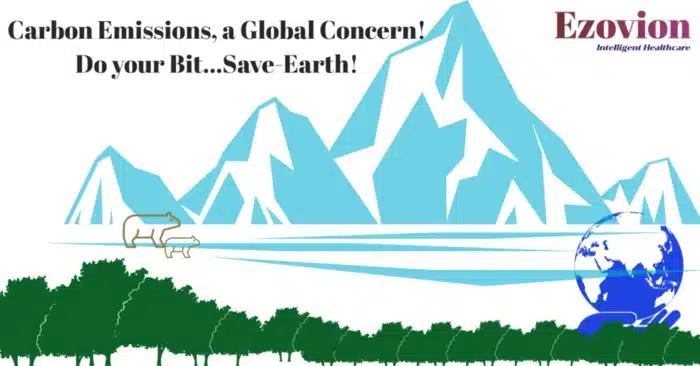Carbon Emissions, a Global Concern!
Carbon Emissions, a Global Concern!
Why it matters?
The greenhouse gases have kept the Earth’s climate habitable for humans and many millions of other species by trapping heat from the sun. But the greenhouse gases are out of balance and threatens the lives on the planet — Earth.
The levels of carbon dioxide (CO2) in the atmosphere currently are at the highest level, which is caused by fossil fuel burning by humans. Carbon emissions are overwhelming and carbon emission growth has caused the ice caps of the Arctic to melt, resulting in rising sea levels and causing damage to wildlife, destroying their home!
The common gas emitted into the atmosphere includes Methane (CH4) is released from natural gas, landfills, as well as by the petroleum companies, and the agriculture process(especially from the digestive systems of grazing animals), Nitrous oxide (N2O) is released from the agricultural process, livestock and includes fertilizer, manure, and burning of agricultural residues, along with burning fuel, and fluorinated gases, Industrial gases such as hydrofluorocarbons, perfluorocarbons, chlorofluorocarbons, sulphur hexafluoride (SF6), and nitrogen trifluoride (NF3) are released when used as refrigerants, solvents and can also be a by-product. These gases absorb solar energy and keep it trapped in the form of heat close to the Earth’s surface without letting it escape into space, and this process of trapping heat is called the Greenhouse Effect. American climate scientist James E. Hansen was the first one to testify the greenhouse effect and explained how it contributes to our climate change¹.
The greenhouse effect has far-ranging health and environmental issues. It contributes to respiratory disease, extreme weather conditions, disruption in food production/supply, increases wildfires creating a major climate change caused by greenhouse gases. These effects are widely recognised, and the world needs to urgently work towards reducing carbon emissions, a primary driver of global warming and protect our planet¹.
Key highlights from 2020 about carbon emissions
The global greenhouse gas emissions descended by 2.4 billion tons in 2020, which is about a 7% drop from 2019. Interestingly the largest decline is recorded due to worldwide pandemic Covid-19 imposed restrictions.
Countries like the U.S saw the largest drop in carbon emission of 12%, the European Union recorded an 11% drop followed by India, recorded a 9% drop and China, a drop of 1.7% in CO2 emissions due to decline in transportation activities.
Emission could rebound in 2021, as predicted by researchers and has urged all the related organizations and government sectors to prioritise and implement policies to tackle climate changes.

In 2020, the Intergovernmental Panel on Climate Change (IPCC) reported an interesting fact about global warming. Reducing global warming to 1.5°C is required to control unprecedented changes in the environment. It also mentions the net carbon dioxide (CO2) emission from human-caused emissions would also need to fall to net-zero around 2050².
What is a Carbon Footprint?
The total amount of greenhouse gas released into the atmosphere that comes from the Humans, Industries or by a particular activity.
How does an individual contribute to Carbon Footprint?
The bulk of an individual’s carbon footprint will usually come from housing, food, and transportation.
How can we reduce greenhouse gas emissions?
· Reduce the use of fossil fuels: Every sector of the global economy should collectively work towards reducing greenhouse gas emissions. China, the United States, and India are the major contributors to the world’s greenhouse gas emissions. It is crucial to move away from fossil fuels and use renewable sources to boost energy efficiency and reduce carbon emissions to avoid effects on climate changes.
· Conserve trees & forests: To reduce carbon emissions just phasing out fossil fuels will not help, but planting trees, conserving existing plants, trees, forests, and grasslands, reducing CO2 from factories and powerplants are some of the other ways to rely on capturing CO2 from the sky.
· Constantly monitor greenhouse effects & implement solutions: Government sectors and various organizations around the world monitors climate change and measures greenhouse gases to track all the impacts and implement solutions to overcome the greenhouse effects. One such organization is the Intergovernmental Panel on Climate Change (IPCC), the United Nations body that works towards tracking and implementing solutions to reduce greenhouse effects.
There is a need for real solutions to reduce carbon emissions globally. There are choices me, you & we can all together make in day-to-day life to reduce personal contribution in the amount of carbon dioxide released into the atmosphere.
While there are many ways, we can contribute to reducing carbon footprints individually. Here are the few little things we can do and listed below for you.
· Using public transportation, carpooling, driving low carbon emission vehicles with high mileage, and switch to electric vehicles. Avoid unnecessary braking and acceleration. Drive wisely!
· Improve home insulation.
· Switch to LED/compact fluorescent bulbs. Turn off lights/fans/AC, any electronic devices when not in use and when you leave the room. Use a programmable device to turn off the heat/air conditioning.
· Walk, go biking to office, parks and to nearby places. It can be a great workout to keep us healthy and reduces emissions.
· Use natural resources. Install solar panels to the roof of your home. Save electricity save money! And even make money by selling electricity back to the grid. You will get financial assistance from the government for solar panel installation.
· Eat organic food. Change your diet, reduce meat and dairy product intake.
· Reuse and recycle.
· Reduce water usage. It reduces the energy used to pump, treat, and heat.
· Use renewable and clean resource of energy.
· Use reusable bags to avoid plastic.
· Contribute to the projects that work towards reducing greenhouse gases.
· Be responsible and take initiatives to protect our planet Earth.
To conclude, climate change is alarming and solving it is a global challenge. Governments of all the nations and other organization should create well-defined projects, policies and implement it to tackle climate changes due to greenhouse gases. But that is not enough, the individual actions from everybody are crucial to breakdown the climate-related issues and address them bit by bit. We all could make a difference by changing our day-to-day habits. Let us make a sustainability-oriented decision. Take a small step and make a difference to lessen personal contribution to climate change. Do your bit!
Save Earth-Do your Bit!





